As the Marvel Cinematic Universe continues to sprawl and franchise fatigue becomes a term that audiences are increasingly aware of, the question increasingly becomes what branches of the story continue to hold our attention. After Loki’s first season, it’s an understatement to say I was dispirited. The show had some major problems in storytelling, and fell short of the promises made by the head writer around the titular character’s genderfluidity. So despite exciting additions to the cast (like Ke Huy Kuan, my childhood hero), I remained distant and skeptical. Won’t get fooled again, and all that.
So… the second season of Loki was what I’d exactly been waiting for, turns out.
After the finale of season one, we follow Loki (Tom Hiddleston) as he makes it back to the Time Variance Authority after watching another variant of himself (Sophia Di Martino) prepare to murder He Who Remains (Jonathan Majors)—the man who would be Kang. After making a suggestion that none of Loki’s friends from the TVA know who he is in that final scene, the second season thankfully dispenses with that curveball in short order. The confusion is the result of Loki having developed a brand new ability called “time-slipping,” which brings him to different moments in time at the TVA, a place that technically doesn’t have time, but let’s ignore that for now.
There’s a lot of that in the second season of Loki, to be fair: The plot is meant to be a cleverly stitched time travel puzzle, but there are plenty of holes in the picture it makes up, and plenty of deus ex machina employed to cover them. You could possibly argue that using deus ex machina in a story that revolves around a god who is very good at skirting rules and regulations is a feature, not a bug, but that’s for the viewer to decide. And, of course, there are some changes within Loki as a character that make this choice all the more interesting, which I’ll get into below.
Sylvie, the variant who killed He Who Remains thus unleashing endless versions of Kang into the multiverse, escapes to a branched timeline in 1982 Oklahoma while Loki has a realtime panic attack in front of Mobius and the TVA head staff, trying to convince them to take this new He Who Remains variant threat seriously. At the same time, former TVA judge Ravonna Renslayer (Gugu Mbatha-Raw) and admin AI Miss Minutes (Tara Strong) escape into the past and give the TVA handbook to very important young man—the first of those variants, who grows up to be a fellow called Victor Timely.
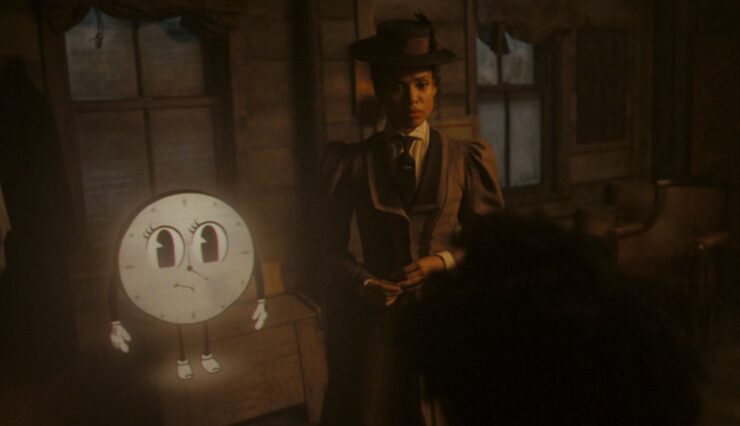
Back at the TVA, the loom that holds all of time is failing under the new branches that are evolving now that the TVA is no longer pruning them down to a single vein. To help with this and Loki’s time-slipping, Mobius recruits a technician named Ouroboros (Ke Huy Kuan), the guy who literally wrote the TVA handbook. O.B.—a character who pings you right in the childhood if you were a Goonies fan, as he often reads like a grown up version of Data—proceeds to figure out that they’re all going to die if they can’t fix the loom, which requires a He Who Remains variant or Miss Minutes to access… so the chase begins.
The second season knows what it’s got going for it, namely the rapport between Loki and Mobius, and also between their outrageously endearing costars like B-15 (Wunmi Mosaku) and Casey (Eugene Cordero) and O.B. Sylvie, too, is a bright spot of the season, constantly challenging Loki to be more honest and thoughtful about his shifting viewpoints on the universe and his place in it. She’s the person who finally forces him to admit that the entire reason he feels such a pressing need to save the TVA is because these people have become his friends, and he no longer knows who he would be without them.
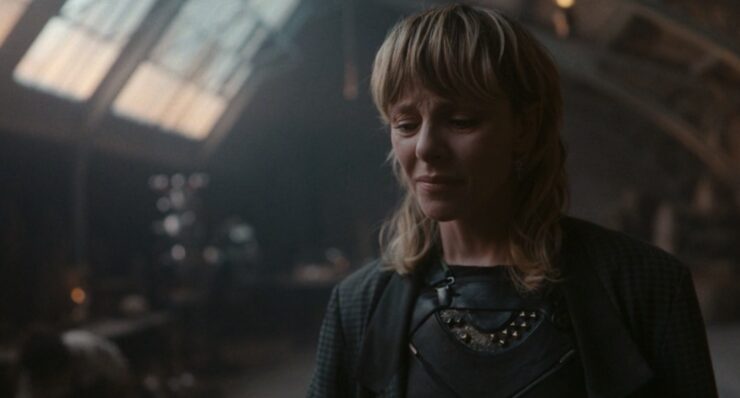
There’s still a problem in how many of the show’s female characters get depicted, unfortunately. As a compounding of my previous complaint that Sylvie doesn’t get to have any fun at all as a Loki variant, there’s an issue mid-season where nearly all the women on the show come into conflict with the ends that Loki and Mobius are trying to achieve, and several fights that occur on that front. The result is both of our male protagonists repeatedly trying to explain to women that everything they’re attempting is wrong because it doesn’t align with their goals—and, of course, the audience is inclined to see things their way, being the primary vantage points of the show. Loki and Sylvie’s dynamic at least equalizes by the end of the season, with both of them having things to teach the other; which is as it should be as they’re essentially the same person with the benefit of different experiences. But it’s still upsetting that Sylvie isn’t considered important enough within the series to truly receive her own development. She is only ever used to counterbalance Loki’s perspectives.
There’s also an absolutely bananas love triangle that occurs between Victor Timely, Ravonna, and Miss Minutes. And no, I’m not saying bananas because it’s between two humans and a cartoon clock; that’s just funny. The bananas-ness of this choice is in (a) the trend of film and TV writers being unable to conceive of female-coded AI / robots without assigning them romantic inclinations toward the men in their lives, and (b) Renslayer’s entire demeanor flipping upside-down the instant that Timely is gallant toward her. This woman is too competent and too canny to potentially ruin her entire nefarious plan over a day’s worth of flirting. Either spend time developing that dynamic, or don’t bother. And, of course, there’s additional devastating awkwardness to all of this in Marvel’s unwillingness to make any choices around Jonathan Majors’ tenure as Kang, following allegations of domestic abuse that have been brought against the actor.
There are likely going to be accusations of queerbaiting against the show, and I can’t disagree from a critical perspective whatsoever… because we’ve oddly moved from Loki being smitten with Sylvie (and he still is a little, but he’s pulled himself together about it) to being utterly devoted to Mobius in a way that harkens backs to the Cap/Bucky dynamics of old. It’s still not good to queerbait, kids, but I’ll admit to being incredibly pleased that season two of Loki suddenly had me pulling for the God of Mischief to fall into the arms of Owen Wilson. I wasn’t expecting to go on that journey, but then they had a pie date, and rode a tandem bike, and Loki tried to impress the guy by being extremely extra in a James Bond-style footchase, and then smoothed his hair and straightened his jacket when going to speak to a branched-timeline version of Mobius who didn’t know him, so yeah, whoops, this is where I live now? Weird U-turn, but I’m down.
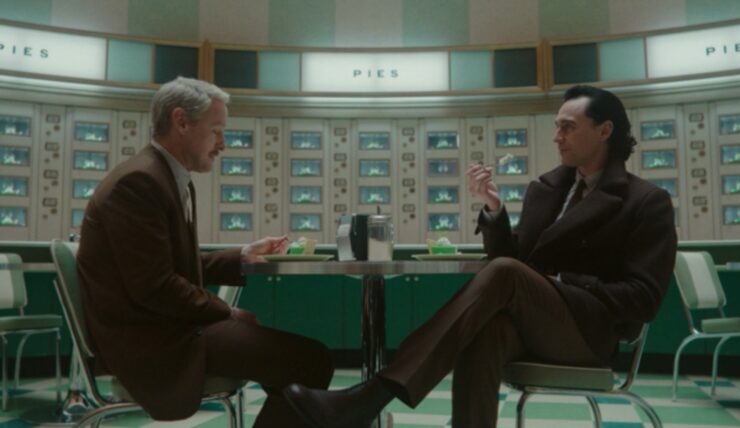
The final episode contains a lot of groundhog-day-esque comedy once Loki has learned to control his time-slipping problem and turn it into another power that would probably make every other superhero envious. (I’m guessing this is an ability that they’ll have to somehow rescind before ever introducing the character into another MCU story because… well, it’s too much power, and way too convenient a fix for any problem outside the one that’s occurring here.) But moreover, the episode addresses one of my key beefs with the first season of the show—namely that He Who Remains offered Loki and Sylvie two options at the end of time, and they both took those options to heart and never bothered to find different solutions, as their characterization demands. This time around, we see Loki once again presented with two options, and he finally gives the response that lives up to his name: I’ll find another way.
There’s another aspect of this season that tickles me personally, which is an unspoken interface with some of my favorite runs of Loki comics, runs where it’s made clear that Loki isn’t just a God of Mischief, but a God of Story. (This was absolutely intentional on the part of the series, it turns out—Loki has actually been redubbed the God of Story by Marvel Studios following the season’s finale.) In many ways, Loki is a metafictional character—not to the extreme extent that, say, Deadpool is, but still similarly situated. He is aware that he is pieces of many narratives, stretched out across time, that he is spoken of as a character far more than a person. To that end, part of his power is wrapped up in shaping story. And that’s what season two of the series allows him; awareness of the narrative, and the ability to rewrite it. But this time, he does it with an eye toward everything he cannot bear to lose.
What I’m saying is, I also didn’t expect this season to depict Loki birthing the multiverse with the power of love? But that’s pretty much exactly what goes down.
The final scenes of the season are about the newly minted God of Story reaching a new state within said godhood; stripped down to his archaic roots, having already spent untold centuries at his task, he finally ascends a throne that is meant for him—one bound up in service to others. “Because that’s what heroes do,” as his brother would say.
Thor would be so proud of this he might explode.
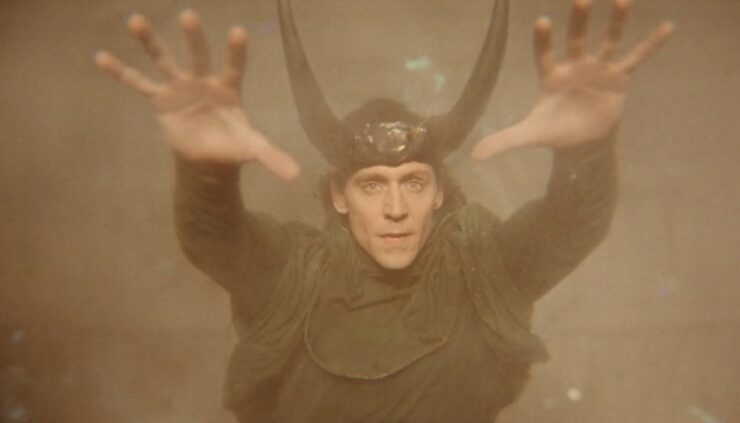
It feels final, and obviously never will be. (Loki and Thor must reunite, for a start, one would hope—Loki hasn’t even met his niece yet.) But this was the path I was hoping the series would take at the outset; far-reaching consequences, a learning journey, a whole lot of historical shenanigans, silly sci-fi mechanics, and the chance for a character who has always been lonely and displaced to create the home he needed. Another season might be fun if they can swing it, but if not, they’ve managed an ending worthy of the prince formerly known as the God of Mischief.
Emmet Asher-Perrin is deeply obsessed with the costuming choices on this show, but particularly that final helm. You can bug them on Twitter and Bluesky, and read more of their work here and elsewhere.










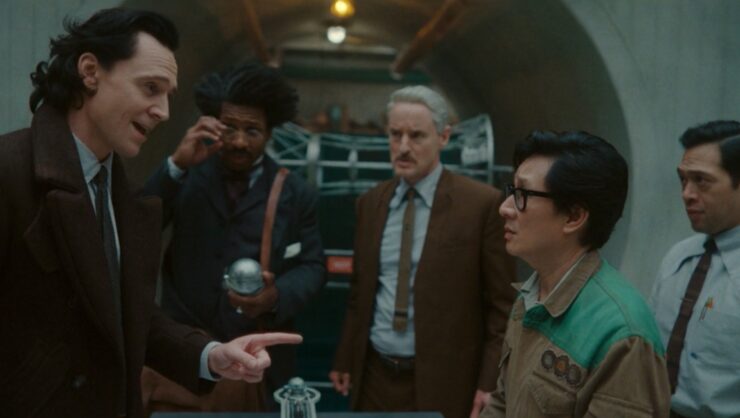
In the finale Loki is talking urgently about people on timelines deserving free will, and this is (a branch from) the same guy who told all Midgard that we would actually be happier without it. It’s not clear how much subjecive time has passed for him — it happens before the “cenuries later” title card — it doesn’t feel like very much. It worked fine. They highlighted that this is a person known to switch sides. But the whole show made a teddy bear version of Loki, so it really doesn’t feel very connected with the movie character.
I enjoyed the first season, and the second season even more. The chemistry between Loki and Mobius was great, and OB was wonderful. You raise some good points about the show’s flaws, Emmett, but I didn’t notice them as I was watching. The end was a little rushed, but this was the best show Disney+ has ever aired.
Glad you liked it, but this season didn’t work for me at all. It was far too driven by plot, by the characters spending most of the season just going through the mechanics of trying to solve a single technological problem that turned out in the end to have been deliberately pointless all along. The story didn’t feel like it was really about anything thematically, wasn’t exploring larger ideas like season 1 did; it was just “how do we solve this problem” over and over again, like we were watching an RPG campaign play out. (I know some gamers like to develop character in their RPGs, but there are others who are just in it for the plot mechanics, and that’s the kind I’m referring to.)
I didn’t see any significant characterization for Loki for most of it, since he was just reacting to events and going through the problem-solving motions; you could’ve substituted just about any generic lead character and it would’ve played no differently. I saw very little of Loki as a trickster or an anti-authority figure; indeed, he was a pure company man fighting on behalf of the quite literal Authority, even if he did want to reform it into something less multiversally genocidal.
It didn’t help that the entire season felt like an afterthought. Instead of advancing the story beyond where season 1 left it, it just circled around and relitigated the ending of season 1, with the characters trying to prevent that ending from being undone and then literally revisiting it in the climax, so we were back where we started (or where the previous season ended). There was no sense of forward movement of the story, just cleanup of leftover business.
I agree, also, that the female(-coded) characters were poorly handled, Miss Minutes especially. Victor Timely was an annoyingly played character who was ultimately little more than a plot device. Too many threads were set up and allowed to fizzle, like the conflict between Dox’s traditionalists and the reformers that should’ve been the real focus of the season. There was too much running around the corridors and rooms of the TVA, so that the whole season felt like a bottle show.
On the plus side, it was very well-directed and performed and produced, and of course Ke Huy Quan was a highlight. But that’s symptomatic of the problem of an MCU that makes shows without showrunners, as we’ve recently learned they’ve been doing — and the problem I’ve seen in feature films for decades. When movies (or TV) aren’t writer-driven, the results are often superb on every other level, but sabotaged by a weak or incoherent story, so that it’s a beautiful structure on a flimsy foundation doomed to collapse. This season was great to look at, but there was very little beneath the surface.
AMEN BRUDDA
Can we talk about the TVA faction conflict? In the absence of Renslayer, we end up with two sides – the Loki-inspired Reformists led by Judge-what’s-her-name, the short older lady. On the other we have the hardline Traditionalists, lead by the very Scottish General Dox. Episode 2 ended with possibly the biggest calamity the MCU has seen so far, with Dox and her loyalists pruning hundreds of branches and in the process killing trillions, yet it comes out of nowhere and is somewhat brushed over. I got the feeling that it only happened because the writers needed to buy time before the Loom broke down. It was a shocking end of an episode, but the aftermath and the implications are not really lingered on. Lest we pursue this conflict between reformists and traditionalists further, Dox and her troops are brutally executed by Renslayer in one of the most disturbing scenes of the show, ending that plotline for good. We don’t even get to follow up with Renslayer since she’s pruned pretty quickly. The fact that I can’t even remember the name of the good judge despite her being the de-facto head of the TVA just goes to show how little attention this plot was given, despite it being one of the most interesting and promising storylines.
As someone who loved the end of the season, and possibly the series, if not every step it took to get there, I found the finale to be triumphant and beautiful. One problem I had with both seasons which I have yet to see anyone else question is why the show is so entirely human-centric? I can live with the idea that as a human HWR prefers having humans as his operatives in the TVA. It might even be an interesting statement about humans tending to devolve into fascism under stress. But every event is basically on earth, the one episode in the first season that does take place elsewhere is on a colony of humans. We don’t even see non-humans in the Void, Gator Loki aside.
I am also a bit bemused how many people are claiming queerbaiting. I don’t see it and after so many claims I was REALLY looking but other than the bicycle built for two scene which I took as a gentle poke at the fans who have been accusing the show of baiting.
I really enjoyed the finale, although I found the rest of the series slightly wordy and slow. But I enjoyed it anyway. There were so many amazing actors in this series – Mbatha-Raw (look up her bio, she is amazing) and of course Ke Huy Kuan who was so much fun. I totally got why Sylvie/Loki relationship cooled after such a big thing happened, and I really liked how Sylvie was so stubborn the whole way through. This is the first I’ve heard of queerbaiting in this series and certainly didn’t notice, but I guess you see what you’re focused on. I felt uncomfortable, for example, in every scene with Jonathon Majors in it – would I have felt like that without knowing about the allegations? I am wondering if this ending means there’s no need for further Kang scenes in future films.
@6/Carla: “I am wondering if this ending means there’s no need for further Kang scenes in future films.”
On the contrary, the implication is that with He Who Remains’s mechanism for preventing other Kangs’ existence being destroyed once and for all, there’s nothing to stop more of them from coming in the future. So this was presumably intended as the setup for his future appearances building to The Kang Dynasty.
As for Majors’s issues, there’s no reason Kang couldn’t simply be recast, as the MCU has done with characters such as Bruce Banner, Jim Rhodes, and (upcoming) Thunderbolt Ross. I mean, their reason for not recasting T’Challa was out of respect for Chadwick Bozeman’s memory, but that’s hardly an issue here.
However, there are reports that the weak performance of Quantumania has the Marvel bigwigs reconsidering their planned Kang story arc. So we’ll see.
I’ve seen several articles over the years claiming Hiddleston has been carrying the MCU, amusing to see that they made it literally true.
As much as I enjoyed the performances, especially Ke Huy Quan’s as O.B., I can’t say I loved the season. I enjoyed many of the individual scenes, but they didn’t add up to much. At the end of Season One, we had He Who Remains getting killed, the multiverse sprouting, and an army of Kangs descending upon the multiverse. At the end of Season Two, we had He Who Remains getting killed, the multiverse sprouting, and an army of Kangs descending upon the multiverse. It felt like the only point of it was to dispatch with this variant of Loki.
I absolutely loved that the result of Loki’s weaving at the end looked like Yggdrasil, the world tree.
Have to say I enjoyed this season more than last season. And I felt that that the character growth was real and earned here, more so than season 1. All the plot machinations served a purpose for me, and they all seemed necessary for Loki as protagonist to get where he did.
“It’s not a science problem, it’s a STORY problem.”
While I did enjoy the season, I was a bit disappointed with several parts of the plot. Starting with “why does the TVA and the temporal loom need saving”. Is it about the people? Just port into a suitable timeline and enjoy the fries. In the end, I vaguely understood that the loom exploding was actually destroying the entire multiverse, hence the need to find a solution. And it was further explained that it was a feature, not a bug (a failsafe designed by HWR to reset the branching… by the way, I’m not sure how the sacred timeline is spared from the multiverse deleting event) Did I even get that right? It was a convoluted plot point for sure. My confusion about this whole thing made Loki’s “ascension” (his glorious purpose!) a bit less satisfying (as he was apparently fixing a problem I wasn’t sure I understood)
Nitpick number 2: the mechanics of time-slipping don’t seem entirely consistent. In the final episode, it seems Loki slips into himself: future Loki can transfer his conscience into his past self at will (providing that nice “Butterfly Effect meets Groundhog Day” feel). However, that’s not how Timeslipping works earlier in the season, as Loki seems to be timeslipping as a separate entity, to the point where he sees himself -and eventually is able to “kill” himself. I’m not sure this ever got explained, unless we can understand it as hand-weaved with “I now control it and can do fancier stuff”
“It feels final, and obviously never will be.” YES. Loki is in the most enviable position in the multiverse. He could remain an isolated God of Story or be entwined with another, and each of them would be equally satisfying. I kept startling myself remembering that THIS Loki was the one who had just lost the Battle of New York to the Avengers, failed Thanos, and was about to go on to do some of his most selfish (and yet also endearing? why is he like this?) nonsense in “Dark World.” This variant wouldn’t tell Thanos he’d never be a god, but then, he’d never need to.
I love @14’s typo of “hand-weaved” given where the season ended.
The S1 cliffhanger / S2 opening scene is still never explained. I didn’t get the sense that we’re supposed to have chalked it up to Loki slipping to a time before he was brought in, since we know Mobius has long been a fan.
Jonathan Majors was… not great, and that’s separate from the much bigger issues surrounding him; most of the rest of the main cast was top-notch. I’ve seen the sets rightly praised online — although TVA HQ felt surprisingly constricted — and Natalie Holt’s score was among my absolute favorites in, heh, I was going to say “in some time” but that’s too precious even for me.
Elsewhere online I suggested that having Renslayer become aware that she’s a Kang variant and using Gugu Mbatha-Raw in place of Majors going forward could be a very neat solution. The answer is right there in Sylvie. Loki’s variants as seen in that limbo from Season 1 were cool from a fan perspective but also because, you know, it just makes sense in the context of infinite branching realities that Loki could be female or significantly older or younger or a reptile. The Kang variants all being Jonathan Majors, like all the Scott Langs in Quantumania being identical Paul Rudds, were disappointing given the other Peter Parkers appear in No Way Home. Whatever, Ravonna escaping her fate and showing up later to proclaim herself She Who Remains is for me a moment waiting to happen.
My biggest issue with the season is that it was far too quick and short given the material.
I’m a little sad we didn’t get to do weekly columns for this show as it would have been fun to discuss, but I didn’t really have time to keep up with it anyway, haha (I’m very behind on several Tor columns right now, haha…trying to take advantage of Thanksgiving Break to binge a bunch!).
I did enjoy it – and I think the question of when do we rebuild and when do we destroy (and to what end) is a really interesting one, and I agree with some that in some ways they didn’t always explore that as well as they could in terms of the TVA politics. I will also admit I’m not entirely sure why Loki is suddenly so sold on the TVA and wanting to save everything – would that brief moment he had in the Time Theater REALLY be enough to make him rethink his entire worldview, I don’t know. Then again, maybe it makes sense that at first he is drawn to the more authoritarian view that Kang represents – maintaining the single timeline to avoid the multiverse war…and it isn’t until later he is able to somehow find a ‘third option’ between that, and just the proliferated timelines that result in the Kang variants re-appearing.
That said – I am assuming that they ARE still looking for and pruning (if necessary) Kang variants, right?
I’m still not sure if, as Sylvie claims, that the TVA represents a complete lack of free-will. I got the impression people still generally have free will and can make choices, it’s just that certain choices are ones that will result in an alternate timeline end up pruned after the fact. So I suppose functionally it’s kind of the same thing, but I don’t think anybody is ‘making’ anybody make those choices, it’s just that only the ‘right’ choice remains (and again, it seems like it really only applies to specific ones).
Then again – and this to me is a general issue I have with multiverse storytelling – I think the idea that there are infinite universes where everybody has made every choice almost dilutes the idea of free will anyway, since in a way it makes all our choices meaningless’ if there are versions of me that have made every single other choice possible, what even is ‘me’? I’m not sure that the multiverse is intended to be THAT branched, but…I dunno.
Regarding Rennslayer “suddenly” flipping her attitude towards Timely after a little flirting, I didn’t understand it that way. She had already had a romantice relationship with He Who Remains before getting mind-wiped. To me, it seemed like either Timely re-surfaced the forgotten feelings in her, or else theirs was a relationship that was always going to happen because of who they were.